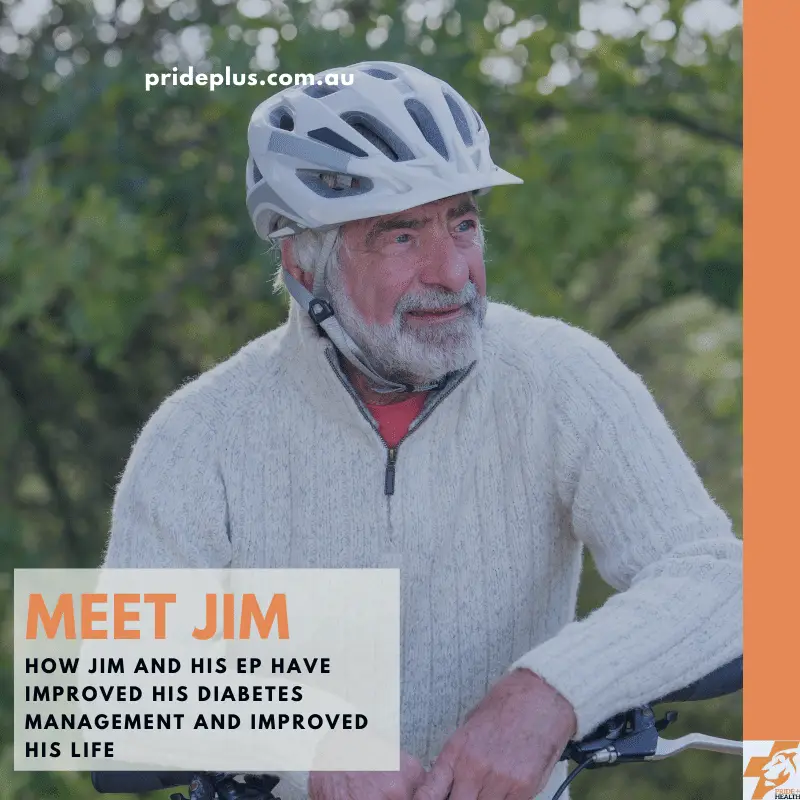Our EPs (Exercise Physiologists) specialise in exercise for the prevention and management of diabetes.
We have many clients who benefit from targeted exercises for diabetes.
Let’s walk you through one of their stories.
Meet Jim
“I’m a 58 year old bloke with Type 2 diabetes, hypercholesterolaemia (elevated cholesterol), I’m a bit overweight, I have osteoarthritis in my right knee, and have hypertension (high blood pressure).
My doctor told me to do more exercise. To make it easy he referred me to an EP (Exercise Physiologist) under a General Practitioner Referral for Group Allied Health Services under Medicare for patients with T2DM. This allowed me to receive medicare rebates for a 1:1 initial consultation and 8 x group exercise sessions funded under medicare, a great start to my exercise journey.
Prior to seeing my Exercise Physiologist Mike, my movement capacity and function with everyday tasks was getting worse. I was at an increased risk of having a cardiac episode (heart attack or stroke). I thought attending the local gym 3 days per week for walking and cycling at moderate levels for 20 – 40 minutes was enough. But my EP taught me that resistance exercises (like lifting weights) was a key component that was missing from my exercise routine.
During my initial consultation with my EP we established that my goals were to increase my exercise tolerance and strength for health and wellbeing, reduce body fat tissue and increase lean muscle mass. I also wanted to reduce knee pain and reduce cardiac risk factors, such as my weight and my high blood pressure.
Due to my lack of strength and fitness I had weak knees, hip and leg muscles, weak core muscles and tight lower leg muscles. I had developed a limp when walking to protect my right knee. I was unable to use the muscles that protect my right knee from overloading. I was fatigued on a low bike setting (level 2) and on the treadmill (incline 3, speed 3.5 km/hr). My weight was 104kg (BMI 35.9), and blood pressure was high (150/80).
I attended the group classes once per week and added 15-20 minutes of weights into my gym session that I was already doing. My EP helped me improve my walking, taught me how to perform weighted exercises safely and effectively, educated me about interval training, resistance training, compound resistance exercises, and helped me stay focused on my goals.
Over the 9 weeks I noticed a gradual but steady increase in exercise loads. My exercise bike setting increased to level 7, treadmill incline went up to 12 degrees and my walking has improved. I can perform 10 bridges for 10 seconds with good breathing technique and recruitment of my leg and core muscles. I can perform 3 x 15 of the following: squats with 90 degrees of knee flexion carrying 12kg, cable rows carrying 20kg, arm curls with 6kg in each hand.
At 9 weeks my Weight is 99.7 kg (reduction of 4kg), BMI 34.5 (was 35.9), BP 125/68 (was 150/80).
I am feeling confident and enjoying the exercise routines. I’m more active than before and I am continuing to improve. With my cardiac risk factors lowered I look forward to enjoying life again! I’ll continue to head to the local gym and the weekly class with my EP as well. It’s been completely life altering for me, like I said, a great start but still some more fun work to go.”
Be Like Jim. Get An Exercise Physiologist Help With Diabetes Management
If you have diabetes and looking to improve how you manage your condition and many linked risk factors like weight, blood pressure, mental health and arthritis pain make an appointment with our exercise physiologists.
To make accessing care easier you can talk to your GP and obtain referrals for 1:1, group or a combination of sessions if you fit in medicare’s eligibility criteria.
While you’re here, do you know why you must see a podiatrist if you have diabetes?




